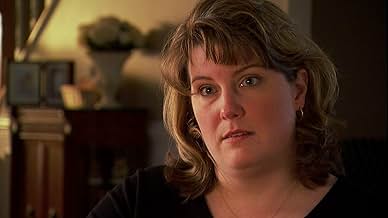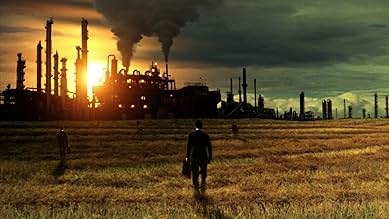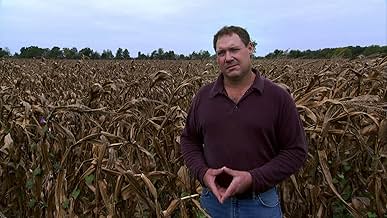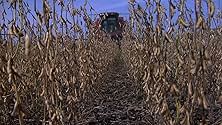Food, Inc.
- 2008
- Tous publics
- 1h 34min
NOTE IMDb
7,8/10
53 k
MA NOTE
Ajouter une intrigue dans votre langueAn unflattering look inside America's corporate controlled food industry.An unflattering look inside America's corporate controlled food industry.An unflattering look inside America's corporate controlled food industry.
- Réalisation
- Scénario
- Casting principal
- Nommé pour 1 Oscar
- 7 victoires et 20 nominations au total
Avis à la une
This documentary does a good job educating the consumers on how food is produced,packed and marketed in U.S nowadays. By going back repeatedly to how it was before it shows us how much it has evolved and also the effects of those drastic changes on food prices, American eating habits and ultimately on their health. The movie does all that without ever going over the top or becoming apocalyptic, which seems to be a trend for these type of movies nowadays,it does call out the greedy mega food corporation and the state officials for not arming the regulatory agencies better but the consumers are also at fault here for not informing themselves enough on the content of the products in order to choose what's best for their health not just for their wallet.
I recall a story where a teacher had tasked her students to draw a picture of a chicken for art class, and to her surprise, one of them drew a chicken fillet. I suppose the point here is that we've become so detached from the origins of our food sources, save for the form they take when already in the supermarkets, cured and prepared with ready to cook/eat processes becoming the norm of our daily lives. And with periodic cases of food scares and poisoning, this film takes a look throughout the food chain of today, and although it's rather US-centric, it still has plenty of relevance here since after all, we import almost everything.
With technological research applied to our food sources, be it the humble grain or to the meat to satisfy all us omnivores out there, the drive of course is to produce enough to feed all the mouths, although sometimes things get done out necessity, and spiral out of control when the pressure's there to produce food that can grow faster, fatter, and to shorten the time it takes to get to the dining table.
Directed by Robert Kenner, this is a documentary that followed some of the points that you would have become familiar with in films like Fast Food Nation, whose writer also provided an interview and laid the foundations of our predicament quite squarely on the MacDonald brothers, who had revolutionized the way food gets prepared, presented, and sourced. Kenner cleverly sections the film into digestible chunks, each focused on aspects of the food chain and the products themselves. The stark images and footage on how animals are treated as products in an assembly line subjected to the mass production (killing) process, will definitely shock you into thinking – that cannot be right, nor humane. Will it make you swear off meat? Probably.
In fact, the picture got painted in very bleak terms, where food conglomerates continue to grow in size and profits, resulting in the power they have over consumers, politicians and the likes, where choice and options are but a facade on shelves because the brands and products all belong to common parents. Corporations exists for profits, and are not responsible for consequences arising from their drive to make money. Everything else that resulted from that drive, whether or not a negative impact on society and human lives, can be considered collateral in their goal to feed the earth, and profit from it. Naturally, none of the conglomerate representatives wanted to be interviewed for the film, and that comes with no surprise, especially when their underhanded tactics in dealing with opposition, and corrupt practices get exposed through hidden cameras.
And in some ways, the film too makes you feel a little guilty for being part of the fuel on the demand side of things. With demand comes the opportunity to supply, and make money, and corporate social responsibility is still something relatively new as a buzzword that has plenty of room to be translated into action.
But the film is not all noise in complaining and presenting a doomsday scenario, and that's where the film earned merits in providing workable alternative solutions rather than just barking up a tree. It balanced the issues on what we could do, and engages the audience to be catalyst for change, making one realize that one has the power to skew demand to more acceptable methods of production, rather than one bred on convenience. It's not all serious nature here, as Kenner does inject enough well-placed humour into the documentary so that it doesn't come off as too heavy-handed in treatment, in pointing the loaded guns of blame onto others.
Food, Inc. is an incredible documentary about where our food comes from, and for those without an inkling of knowledge, it would be worthwhile to sit through this film and get some enlightenment. More importantly of course, is to take action to prevent our stomachs from becoming just repositories for Salt, Fat and Sugar. Highly Recommended.
With technological research applied to our food sources, be it the humble grain or to the meat to satisfy all us omnivores out there, the drive of course is to produce enough to feed all the mouths, although sometimes things get done out necessity, and spiral out of control when the pressure's there to produce food that can grow faster, fatter, and to shorten the time it takes to get to the dining table.
Directed by Robert Kenner, this is a documentary that followed some of the points that you would have become familiar with in films like Fast Food Nation, whose writer also provided an interview and laid the foundations of our predicament quite squarely on the MacDonald brothers, who had revolutionized the way food gets prepared, presented, and sourced. Kenner cleverly sections the film into digestible chunks, each focused on aspects of the food chain and the products themselves. The stark images and footage on how animals are treated as products in an assembly line subjected to the mass production (killing) process, will definitely shock you into thinking – that cannot be right, nor humane. Will it make you swear off meat? Probably.
In fact, the picture got painted in very bleak terms, where food conglomerates continue to grow in size and profits, resulting in the power they have over consumers, politicians and the likes, where choice and options are but a facade on shelves because the brands and products all belong to common parents. Corporations exists for profits, and are not responsible for consequences arising from their drive to make money. Everything else that resulted from that drive, whether or not a negative impact on society and human lives, can be considered collateral in their goal to feed the earth, and profit from it. Naturally, none of the conglomerate representatives wanted to be interviewed for the film, and that comes with no surprise, especially when their underhanded tactics in dealing with opposition, and corrupt practices get exposed through hidden cameras.
And in some ways, the film too makes you feel a little guilty for being part of the fuel on the demand side of things. With demand comes the opportunity to supply, and make money, and corporate social responsibility is still something relatively new as a buzzword that has plenty of room to be translated into action.
But the film is not all noise in complaining and presenting a doomsday scenario, and that's where the film earned merits in providing workable alternative solutions rather than just barking up a tree. It balanced the issues on what we could do, and engages the audience to be catalyst for change, making one realize that one has the power to skew demand to more acceptable methods of production, rather than one bred on convenience. It's not all serious nature here, as Kenner does inject enough well-placed humour into the documentary so that it doesn't come off as too heavy-handed in treatment, in pointing the loaded guns of blame onto others.
Food, Inc. is an incredible documentary about where our food comes from, and for those without an inkling of knowledge, it would be worthwhile to sit through this film and get some enlightenment. More importantly of course, is to take action to prevent our stomachs from becoming just repositories for Salt, Fat and Sugar. Highly Recommended.
With family run farms pretty much a thing of the past, institutional farming has pretty much taken over,and the dim,dark & dismal effects are omnipresent. There is an epidemic of food borne illness,due to cattle being exposed to over use of steroids to make them grow fatter, faster (and this also includes chickens,pigs,etc.),not to mention GMO corn,grains,etc. Robert Kenner's eye opening film, 'Food,Inc.' manages to shine at least some light on some pretty unethical practices that are being undertaken by corporate owned & managed farms. The likes of Eric Schlosser (author of 'Fast Food Nation',which was made into a semi fictional film a few years back)is featured in interviews,along with Michael Pollan. Many fingers are pointed at guilty parties doing the dirty deeds of the farming industry,along with some pretty unpleasant footage of unethical practices (i.e. abuse of farm animals, although this film doesn't take up any kind of vegetarian/vegan agenda of it's own---the viewer can make up their own mind just what they prefer to eat). Much to my surprise,there is little discussion of the mad cow disease epidemic (or,BSE)from a few years back (only a passing reference). Rated PG by the MPAA,this film contains some unpleasant footage of animal abuse,as well as a rude word,or two. Okay for older children who care about what's on their plate for breakfast,lunch or dinner.
Did you know that it only takes 48 days for a chicken to go to market. Is this natural? This film explores how food is grown, and the concerns that people have, such as the e-coli outbreak that seems to happen every year. I am a lover of meat, but after this film you will want to change some of your practices like switching to Organic etc. This film also explores demand for certain products that are not Genetically modified.
We all have to eat but we can make decisions based on facts, instead of based on perception. People need to be aware that their consequences may have dire repercussions, so if you need to eat, and we all do, then go out and see this.
We all have to eat but we can make decisions based on facts, instead of based on perception. People need to be aware that their consequences may have dire repercussions, so if you need to eat, and we all do, then go out and see this.
The message of 'Food, Inc.' is that most of what Americans now eat is produced by a handful of highly centralized mega-businesses,and that this situation is detrimental to health, environment, even our very humanity. The ugly facts of animal mistreatment, food contamination, and government collusion are covered up by a secretive industry that wouldn't talk to the filmmakers or let the interiors of their chicken farms, cattle ranches, slaughterhouses, and meatpacking plants be filmed.
Informed by the voices and outlook of bestseller authors Eric Schlosser ('Fast Food Nation') and Michael Pollen ('The Omnivore's Dilemma'), this new film is an exposé that offers some hope that things can be made better through grassroots efforts. True, Kenner points out, Monsanto, Smithfield, Perdue, et al. are rich and powerful. But so were the tobacco companies, and if Philip Morris and Reynolds could be fought successfully, so can the food industry. The fact that the vast Walmart is switching to organic foods because customers want them shows people vote effectively with their pocketbooks every time they buy a meal.
Other documentaries have covered this ground before. The 2008 French documentary 'The World According to Monsanto' (2008) focused on how that company, with government support, monopolizes seed planting, and Deborah Koons' 2004 'The Future of Food' went over similar ground. Jennifer Abbott and Mark Achbar's sweeping 2003 film 'The Corporation' (2003) touched on Monsanto's monopoly too. In more general terms, the ominous, narration-free German documentary 'Our Daily Bread' (Nikolaus Geyrhalter, 2003) delivered 'Food, Inc.'s' message about dehumanized factory-style food production with a European focus. Richard Linklater's 2006 'Fast Food Nation' grew out of Schlosser's book about how bad and disgusting American fast food is and how it undermines the health. These are all good films, and there are and will be lots more. As this new film mentions, exploitation and malpractice in the meat industry were exposed as far back as Upton Sinclair's 1906 muckraking book, 'The Jungle.'
'Food, Inc.' is a populist and practical film that speaks with the voices of farmers, advocates, and journalists, and focuses on food, what's wrong with it, and what we can do about it. Kenner offers lots of practical information and appeals to everyday people. The film goes back to the Fifties to show how the rise of fast food contributed to centralized, less diverse American food production. MacDonald's now much of the chicken, beef, potatoes, and many other foods produced in the country. The film explains that only a handful of companies control not only most of the beef, pork, chicken, and corn produced in the US but most other food products as well. Moreover not only is corn the major feed given to food animals, but a surprising amount of the tens of thousands of products sold at today's supermarket -- that packaged junk racked in the center of the store that Atkins and now Pollen have told us to avoid, are also derived from corn. Because of the way certain food products have government support, hamburgers are cheaper than fresh vegetables. Kenner focuses on a low-income Orozcos who both work and feel forced to rely on fast food meals because they fill them and their kids more economically than fresh produce bought at the market.
The new industry has developed chickens that grow bigger faster with more breast meat. They're kept in closed dark pens. The story is the same for all these poor mass produced critters, crammed together in great numbers, filled with antibiotics, deformed, suffering, ankle deep in their own excrement, brutally killed. The film has good footage of the big southern meat producer, Smithfield, showing how the new mega-food industry feeds off of exploited low-wage illegal immigrants who it treats as expendable, just like the animals.
An important spokesman in 'Food, Inc.' is an organic farmer (you could just say a stubbornly old-fashioned one) called Joel Salatin of Polyface Farm in Swoope, Virginia, who's also an author, though the movie doesn't mention his books. His cattle are grass-fed and watching them, we realize that's the way nature meant them to be. They roams free, living a healthy life, trimming back the grass while fertilizing it so it will grow back. Cattle weren't meant to live on corn, and doing so has led to infection. The industry solution to such problems is not to change back to earlier methods, but to add more chemicals. They're doing crazy things like adding bleach to hamburger filler to keep the burgers from being poison.
It's hard to keep a balance in such a documentary but Kenner tries. That Hispanic family is important. Slow food and organics have been a thing of the rich, as their dilemma illustrates. There could be more focus on everyday people and their difficult daily choices. The Walmart story is important too: Walmart customers are everyday people. It's easy enough for well heeled families to buy boutique produce at farmer's markets. Average Joes don't always have the time or the money for that. Also important is Barbara Kowalcyk, who works in Washington with her mother as an advocate for stricter laws. Her 2 1/2-year-old son Kevin died in 12 days from a virulent form of E. coli after eating a hamburger on vacation. She wants not sympathy but control of an indifferent industry. Carole Morison is another vivid voice: she is a southern chicken farmer who lost her contract with Perdue for refusing to switch to dark enclosed tunnel chicken coops, the latest in a series of enforced "improvements" that lead to more production at the cost of more cruelty. She also explains how the farmers in thrall to these big companies are kept in debt like indentured servants.
Armed with witty, clear graphics and ironically bright color, 'Food, Inc.' has a chance of gaining more converts to "slow," organic, local food and opponents to crooked food regulation and monopolistic industry. This seems one of the most balanced and humane treatments of the subject yet.
Informed by the voices and outlook of bestseller authors Eric Schlosser ('Fast Food Nation') and Michael Pollen ('The Omnivore's Dilemma'), this new film is an exposé that offers some hope that things can be made better through grassroots efforts. True, Kenner points out, Monsanto, Smithfield, Perdue, et al. are rich and powerful. But so were the tobacco companies, and if Philip Morris and Reynolds could be fought successfully, so can the food industry. The fact that the vast Walmart is switching to organic foods because customers want them shows people vote effectively with their pocketbooks every time they buy a meal.
Other documentaries have covered this ground before. The 2008 French documentary 'The World According to Monsanto' (2008) focused on how that company, with government support, monopolizes seed planting, and Deborah Koons' 2004 'The Future of Food' went over similar ground. Jennifer Abbott and Mark Achbar's sweeping 2003 film 'The Corporation' (2003) touched on Monsanto's monopoly too. In more general terms, the ominous, narration-free German documentary 'Our Daily Bread' (Nikolaus Geyrhalter, 2003) delivered 'Food, Inc.'s' message about dehumanized factory-style food production with a European focus. Richard Linklater's 2006 'Fast Food Nation' grew out of Schlosser's book about how bad and disgusting American fast food is and how it undermines the health. These are all good films, and there are and will be lots more. As this new film mentions, exploitation and malpractice in the meat industry were exposed as far back as Upton Sinclair's 1906 muckraking book, 'The Jungle.'
'Food, Inc.' is a populist and practical film that speaks with the voices of farmers, advocates, and journalists, and focuses on food, what's wrong with it, and what we can do about it. Kenner offers lots of practical information and appeals to everyday people. The film goes back to the Fifties to show how the rise of fast food contributed to centralized, less diverse American food production. MacDonald's now much of the chicken, beef, potatoes, and many other foods produced in the country. The film explains that only a handful of companies control not only most of the beef, pork, chicken, and corn produced in the US but most other food products as well. Moreover not only is corn the major feed given to food animals, but a surprising amount of the tens of thousands of products sold at today's supermarket -- that packaged junk racked in the center of the store that Atkins and now Pollen have told us to avoid, are also derived from corn. Because of the way certain food products have government support, hamburgers are cheaper than fresh vegetables. Kenner focuses on a low-income Orozcos who both work and feel forced to rely on fast food meals because they fill them and their kids more economically than fresh produce bought at the market.
The new industry has developed chickens that grow bigger faster with more breast meat. They're kept in closed dark pens. The story is the same for all these poor mass produced critters, crammed together in great numbers, filled with antibiotics, deformed, suffering, ankle deep in their own excrement, brutally killed. The film has good footage of the big southern meat producer, Smithfield, showing how the new mega-food industry feeds off of exploited low-wage illegal immigrants who it treats as expendable, just like the animals.
An important spokesman in 'Food, Inc.' is an organic farmer (you could just say a stubbornly old-fashioned one) called Joel Salatin of Polyface Farm in Swoope, Virginia, who's also an author, though the movie doesn't mention his books. His cattle are grass-fed and watching them, we realize that's the way nature meant them to be. They roams free, living a healthy life, trimming back the grass while fertilizing it so it will grow back. Cattle weren't meant to live on corn, and doing so has led to infection. The industry solution to such problems is not to change back to earlier methods, but to add more chemicals. They're doing crazy things like adding bleach to hamburger filler to keep the burgers from being poison.
It's hard to keep a balance in such a documentary but Kenner tries. That Hispanic family is important. Slow food and organics have been a thing of the rich, as their dilemma illustrates. There could be more focus on everyday people and their difficult daily choices. The Walmart story is important too: Walmart customers are everyday people. It's easy enough for well heeled families to buy boutique produce at farmer's markets. Average Joes don't always have the time or the money for that. Also important is Barbara Kowalcyk, who works in Washington with her mother as an advocate for stricter laws. Her 2 1/2-year-old son Kevin died in 12 days from a virulent form of E. coli after eating a hamburger on vacation. She wants not sympathy but control of an indifferent industry. Carole Morison is another vivid voice: she is a southern chicken farmer who lost her contract with Perdue for refusing to switch to dark enclosed tunnel chicken coops, the latest in a series of enforced "improvements" that lead to more production at the cost of more cruelty. She also explains how the farmers in thrall to these big companies are kept in debt like indentured servants.
Armed with witty, clear graphics and ironically bright color, 'Food, Inc.' has a chance of gaining more converts to "slow," organic, local food and opponents to crooked food regulation and monopolistic industry. This seems one of the most balanced and humane treatments of the subject yet.
Le saviez-vous
- AnecdotesOn the Region 1 DVD packaging, the UPC bar-code on the cow is different from the one shown on the theatrical poster. The bar-code on the poster is 4-73762-52481-6-(18). The bar-code on the Region 1 DVD packaging is 8-76964-00216-5 : the same bar-code that appears on the back cover of the DVD. As of 2022, the bar-code used on the poster is not an active code.
- Citations
Michael Pollan: There are no seasons in the American supermarket. Now there are tomatoes all year round, grown halfway around the world, picked when it was green, and ripened with ethylene gas. Although it looks like a tomato, it's kind of a notional tomato. I mean, it's the idea of a tomato.
- ConnexionsFeatured in Au coeur de la nuit: Tim Raue und Dave Arnold (2009)
- Bandes originalesSunny L.A.
Written by Nancy Peterson
Performed by Great American Swing Band
Meilleurs choix
Connectez-vous pour évaluer et suivre la liste de favoris afin de recevoir des recommandations personnalisées
- How long is Food, Inc.?Alimenté par Alexa
Détails
- Date de sortie
- Pays d’origine
- Site officiel
- Langue
- Aussi connu sous le nom de
- P.O.V. Food, Inc. episode #23.1
- Lieux de tournage
- Sociétés de production
- Voir plus de crédits d'entreprise sur IMDbPro
Box-office
- Montant brut aux États-Unis et au Canada
- 4 417 674 $US
- Week-end de sortie aux États-Unis et au Canada
- 60 513 $US
- 14 juin 2009
- Montant brut mondial
- 4 606 199 $US
- Durée
- 1h 34min(94 min)
- Couleur
- Mixage
- Rapport de forme
- 1.78 : 1
Contribuer à cette page
Suggérer une modification ou ajouter du contenu manquant
























